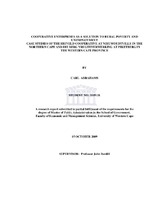Cooperative enterprises as a solution to rural poverty and unemployment case studies of the Heiveld cooperative at Nieuwoudtville in the Northern Cape and Die Berg Vrugteverwerking at Piketberg in the Western Cape Province
Abstract
Historically, the poor have always been socially, politically and economically
marginalized in society. The South African Government’s Cooperative Act 2005
presents a promising step in the right direction towards addressing poverty and unemployment in rural areas. The research looks at two case studies and site relevant findings. This study gives a brief introductory account of cooperatives with regard to their history and existence, particularly in South Africa. The research report focuses on two case studies, where the organisational structures and business operations will be examined and compared. Finally the report will draw lessons to indicate the possible social and economic viability of these cooperatives and their place in rural development. Based on the findings and conclusions, a number of recommendations are made on cooperatives in the rural sector. The research utilizes secondary data, such as documents, records, the internet, books and literature on the subject of cooperatives and related aspects of unemployment and poverty, forming a background of cooperatives in the South African rural sector. Primary data takes the form of structured (personal one on one) and semi-structured (group discussion) interviews. The primary and secondary data present the basis for the report findings and conclusions. Where possible, the relevant recommendations are made.

